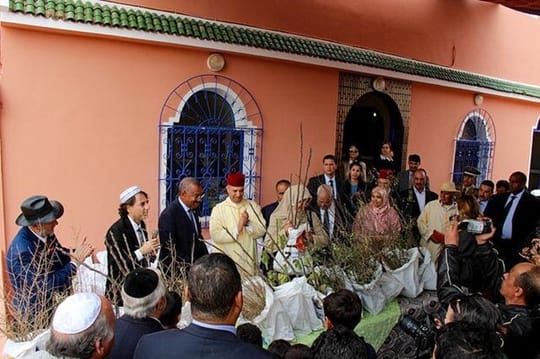Socrates in the Classroom and the Community Hall

By Dr. Yossef Ben-Meir, HAF president
September 28, 2015
Dr. Yossef Ben-Meir explains the importance of a collaborative, sustainable approach to human development, which enables communities, assisted by trained facilitators, to plan their own projects.
Socrates, I imagine, might well have found himself at home at a modern-day community meeting, during which local people discuss the socio-economic and environmental challenges they face and determine solutions to meet their needs, in order of priority.
Rather than transmit an established tradition, the Athenian philosopher (ca. 470-399 BCE) engaged his students in a dialectic that stimulated critical thinking and independent thought and also facilitated adoption of the most logical of several initial hypotheses. Implicit in this approach is the conviction that truth resides within every individual, waiting to be expressed.
A collaborative, sustainable approach to human development enables communities, assisted by trained facilitators, to plan their own projects, thereby creating jobs and generating benefits in health and education. Participants in the process are encouraged to share their experiences and ideas for change and build consensus on plans of action. This participatory approach to community development is, in essence, the application of Socratic methodology by present-day communities.
Further, there are features common to successful community development and educational experiences – which invariably make a powerful impact on participants – that are brought about by building applied and analytical skills, expanding outlooks on societies and promoting human satisfaction. As both a university professor and participatory development practitioner in Morocco, I find great joy and meaning in treating my classroom as a community meeting filled with interaction, data generation, collective analysis and consensus-building. In equal measure, I derive satisfaction and purpose from treating community meetings as learning environments where participants share knowledge, critically assess life conditions and pursue innovation. To meet these goals, both classrooms and community meetings must operate under specific conditions.
Firstly and fundamentally, people must be encouraged to communicate. Individuals should be entirely free to share their perspectives and respond to and challenge each other. The aims of such inclusive discussion are to respectfully acknowledge differences and thereby develop multidimensional viewpoints.
An integral part of productive dialogue surrounding interests and agendas is the acceptance of conflict as inherent and, in fact, productive insofar as its presence can lead to successful resolution. Practically speaking, the process of overcoming differences includes the expression of personal observations and at times, the proffering of an apology, with the deepening of the participants’ relationships as an important outcome. Setting up formal and informal opportunities for writing may catalyze thoughtful contemplation; in a learning and planning environment this would then connect with the dialogue aspect, enhancing and illuminating the entire process.
Critical thinking is also central to sustainable community development and transformative learning. Allowing – even positively facilitating – challenges to our preconceptions and stating connections between actions and their consequences (both vertically and horizontally in society) is necessary to group understanding of multidimensional social phenomena.
Finally, collaborative, experiential learning must also be facilitated in the context of powerful education and sustainable development. This pedagogical method creates a microcosm of the broader sustainable development dynamic, whereby the contributions and talents of individuals are viewed as vital to group endeavor, with each member playing a particular role in achieving the overall initiative. Students build critical knowledge capacities when reflecting practical experiences back to social theory; all participants sharpen their skills and capacities in group settings as they consider social conditions, evaluate and fashion solutions to social problems and implement the change they seek.
If applied effectively, the result of all of this – and particularly of the acknowledgement of the individual within the group – is the collective fashioning of educational and development solutions that meet both individual and communal goals.
Thus, while philosophers since the Enlightenment have posited that individual and communal interests inherently oppose each other, sustainable development and collaborative pedagogical approaches, in contrast, cast these interests as mutual reinforcements.
Examples of the success of the latter are apparent worldwide, including in Morocco, where national park managements and neighboring communities engage in participatory dialogue and enhanced critical thinking as a prerequisite to working in partnership to advance both human development and resource conservation.
In the classroom and in the field, therefore, it is essential that teachers championing this process and facilitators of participatory community meetings adopt a common approach. Like Socrates, they must endeavor to draw out the knowledge participants possess and enable the fusion of group ideas into an entity greater than the sum of its parts. They must catalyze and support critical thinking processes and furthermore, ensure that the entire process is infused with experiential learning, which has been shown to be transformative in terms of both pedagogy and human development.
Cross-fertilizing development and education methodology would bring benefits in all areas. Communities would be in a position to create projects that are appropriate in light of the specific social and environmental factors present. Students will form frames of reference for processes of identifying, creating and evaluating effective social interventions, particularly those that build upward from the local level. Teachers and community facilitators will come to find their natural home in each others’ backyards and integrate their respective methodologies to form an enriching, distinctly Socratic brew.
Dr. Yossef Ben-Meir is a sociologist, former Peace Corps Volunteer to Morocco and co-founder, in 2000, of the High Atlas Foundation of which he is President.
Follow HAF on Twitter @HafFdtn or like us on Facebook
Learn more at www.highatlasfoundation.org
For more information please contact: HAF@highatlasfoundation.org ; +212 (0) 5 24 42 08 21